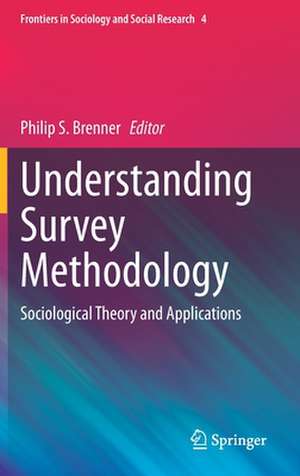Understanding Survey Methodology: Sociological Theory and Applications: Frontiers in Sociology and Social Research, cartea 4
Editat de Philip S. Brenneren Limba Engleză Hardback – 24 oct 2020
Preț: 692.85 lei
Preț vechi: 866.06 lei
-20% Nou
Puncte Express: 1039
Preț estimativ în valută:
132.57€ • 138.43$ • 109.48£
132.57€ • 138.43$ • 109.48£
Carte disponibilă
Livrare economică 25 martie-08 aprilie
Livrare express 08-14 martie pentru 38.09 lei
Preluare comenzi: 021 569.72.76
Specificații
ISBN-13: 9783030472559
ISBN-10: 3030472558
Pagini: 230
Ilustrații: X, 346 p. 21 illus., 3 illus. in color.
Dimensiuni: 155 x 235 x 28 mm
Greutate: 0.68 kg
Ediția:1st ed. 2020
Editura: Springer International Publishing
Colecția Springer
Seria Frontiers in Sociology and Social Research
Locul publicării:Cham, Switzerland
ISBN-10: 3030472558
Pagini: 230
Ilustrații: X, 346 p. 21 illus., 3 illus. in color.
Dimensiuni: 155 x 235 x 28 mm
Greutate: 0.68 kg
Ediția:1st ed. 2020
Editura: Springer International Publishing
Colecția Springer
Seria Frontiers in Sociology and Social Research
Locul publicării:Cham, Switzerland
Cuprins
1. Why Survey Methodology Needs Sociology and Why Sociology Needs Survey Methodology.- Part I : Sociological Theory and Survey Methodology.- 2 Towards Survey Response Rate Theories That No Longer Pass Each Other Like Strangers in the Night.- 3. Advancing Theories of Socially Desirable Responding: How Identity Processes Influence Answers to “Sensitive Questions”.- 4. Culture and Response Behavior: An Overview of Cultural Mechanisms Explaining Survey Error.- 5. Translating Lessons from Status Characteristics and Expectation States Theory to Survey Methods.- Part II; Applications.- 6. Stigma and the Meaning of Social Desirability: Concealed Islamophobia in the Netherlands.- 7. Is Not Knowing the Same as Being Incorrect? An Examination of ‘Don’t Know’ Responses to Questions about Immigrant Population Size.- 8. Power, Culture and Item Nonresponse in Social Surveys.- 9. The Measurement of Sexual Attraction and Gender Expression: Cognitive Interviews with Queer Women.- 10. How Do Interviewers and Respondents Navigate Sexual Identity Questions in a CATI Survey?.- 11. Male/Female Is Not Enough: Adding Measuresof Masculinity and Femininity to General Population Surveys.- 12. Correlates of Differences in Interactional Patterns among Black and White Respondents.- 13. Theories of Public Opinion Change Versus Stability and their Implications for Null Findings.- Conclusions and Future Directions for Understanding Survey Methodology.
Notă biografică
Philip Brenner is a sociologist at the University of Massachusetts Boston where he works in the fields of survey methodology, health research, social psychology, and the sociology of religion. Brenner is particularly interested in the measurement of normative or socially-desirable behaviors, like church attendance and physical activity and exercise. His research has focused on the reasons survey respondents overreport these behaviors; that is, why they claim that they exercise when they don't or why they report that they attend church or pray more often than they do.
Textul de pe ultima copertă
This volume ambitiously applies sociological theory to create an understanding of aspects of survey methodology. It focuses on the interplay between sociology and survey methodology: what sociological theory and approaches can offer to survey research and vice versa. The volume starts with a focus on direct connections between sociological theories and their applications in survey research. It further presents cutting-edge, original research that applies the “sociological imagination” to substantive concerns important to sociologists, survey methodologists, and social scientists and includes issues such as health, immigration, race/ethnicity, gender and sexuality, and criminal justice.
Caracteristici
Applies a sociological lens to survey methodology Draws a road map forward for a cohesive paradigm in the “sociological aspects of survey Highlights research on a variety of social issues of current interest







